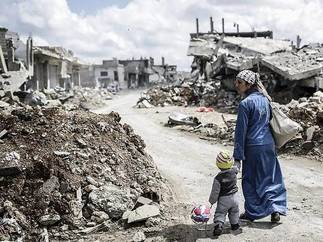
What about the messenger who is to guide us into the paths of peace?The second candle on the Advent Wreath symbolizes peace as Jesus is called the Prince of Peace. Hey, that's something we could certainly use these days. So, why isn't religion part of the discussion about the violence we see? What about the messenger who is to guide us into the paths of peace?
The scriptures talk about a messenger from God who precedes God's coming and judgment. Christians see John the Baptist in this role.
In Malachi, long before Jesus' time, our passage starts with the last verse of chapter 2 which is a complaint that God has about God's people. They're tiresome, wearying. God's people claim that God loves evildoers and that's why they prosper, and God's people whimper about God's indifference, saying, "Where's the God of justice?" The effect of these complaints is to make God responsible for their own problems. As you can imagine, God gets testy now.
God's people have long awaited the coming of God's forerunner, the messenger who is to be like Elijah. 'Oh, you'll get my messenger, but who will be able to stand on that day?' You aren't going to like the coming of this one at all.
The messenger will refine and purify the people, enabling their sacrifices in the Temple to be righteous once again. (Remember a few weeks ago how Malachi shared God's contempt for their unworthy, corrupt offerings in chapter 1.)
There will also be judgment that has an interesting list of targets. In the end, the judgment makes clear that corrupt worship reflects the corruption of the society. This is all their own doing.
In Luke, it is Zechariah's song or psalm, Zechariah being the father of John the Baptist. As it focuses much attention on a righteous Davidic king, it also turns to what the son, John, will do. The promise is that this child will prepare the way of the Lord, bringing knowledge that will bring light. That light will shine in the darkness and through the shadow of death. The purpose is to "guide our feet into the way of peace."
When we finally realize that violence alone is the promise of more violence, maybe then we will turn to religion to have our feet guided in the ways of peace.
(The picture above is of a Kurdish mother and child in the Syrian city of Kobane after it was liberated from ISIS following an assault by Kurdish and coalition forces supported by US-led air strikes.)
Check out the whole sermon either in the video below, or with the download below the video panel.
The scriptures talk about a messenger from God who precedes God's coming and judgment. Christians see John the Baptist in this role.
In Malachi, long before Jesus' time, our passage starts with the last verse of chapter 2 which is a complaint that God has about God's people. They're tiresome, wearying. God's people claim that God loves evildoers and that's why they prosper, and God's people whimper about God's indifference, saying, "Where's the God of justice?" The effect of these complaints is to make God responsible for their own problems. As you can imagine, God gets testy now.
God's people have long awaited the coming of God's forerunner, the messenger who is to be like Elijah. 'Oh, you'll get my messenger, but who will be able to stand on that day?' You aren't going to like the coming of this one at all.
The messenger will refine and purify the people, enabling their sacrifices in the Temple to be righteous once again. (Remember a few weeks ago how Malachi shared God's contempt for their unworthy, corrupt offerings in chapter 1.)
There will also be judgment that has an interesting list of targets. In the end, the judgment makes clear that corrupt worship reflects the corruption of the society. This is all their own doing.
In Luke, it is Zechariah's song or psalm, Zechariah being the father of John the Baptist. As it focuses much attention on a righteous Davidic king, it also turns to what the son, John, will do. The promise is that this child will prepare the way of the Lord, bringing knowledge that will bring light. That light will shine in the darkness and through the shadow of death. The purpose is to "guide our feet into the way of peace."
When we finally realize that violence alone is the promise of more violence, maybe then we will turn to religion to have our feet guided in the ways of peace.
(The picture above is of a Kurdish mother and child in the Syrian city of Kobane after it was liberated from ISIS following an assault by Kurdish and coalition forces supported by US-led air strikes.)
Check out the whole sermon either in the video below, or with the download below the video panel.
| 12-06-15-ff-answers.pdf |
| 12-06-15-message_of_the_messenger.pdf |
